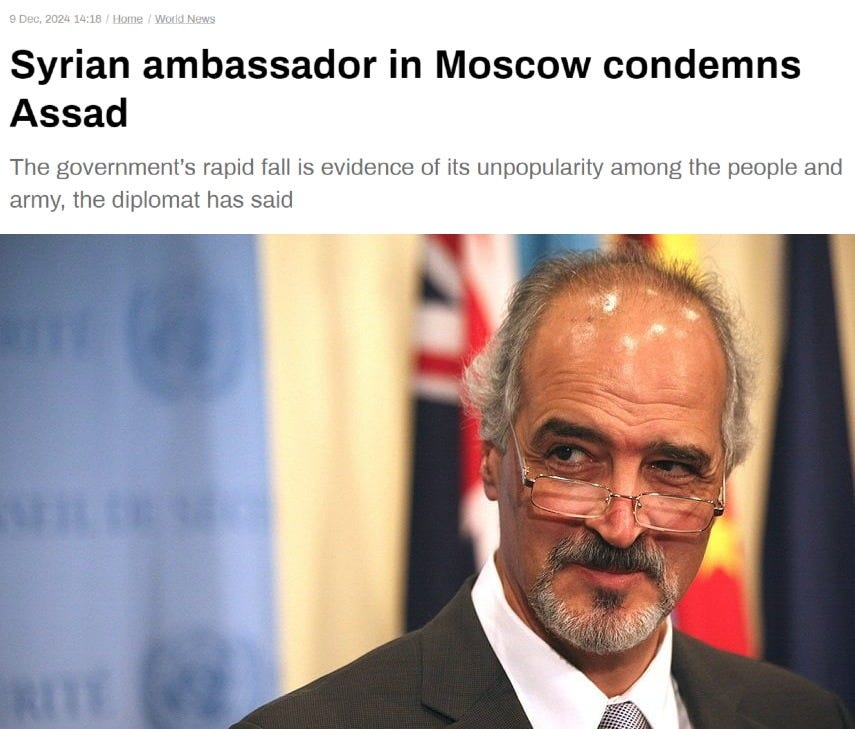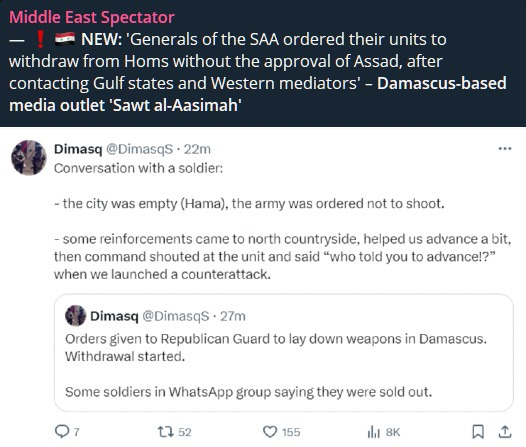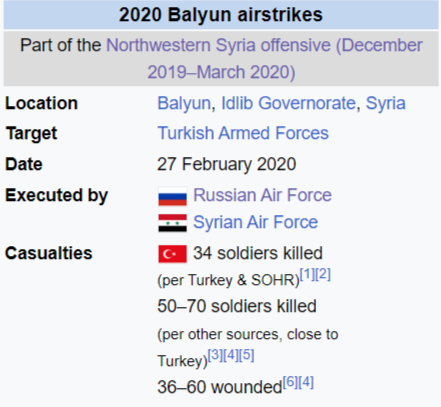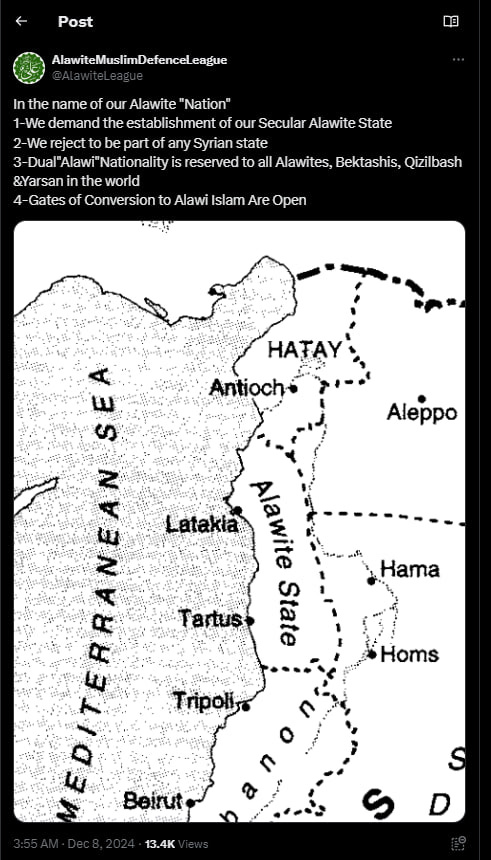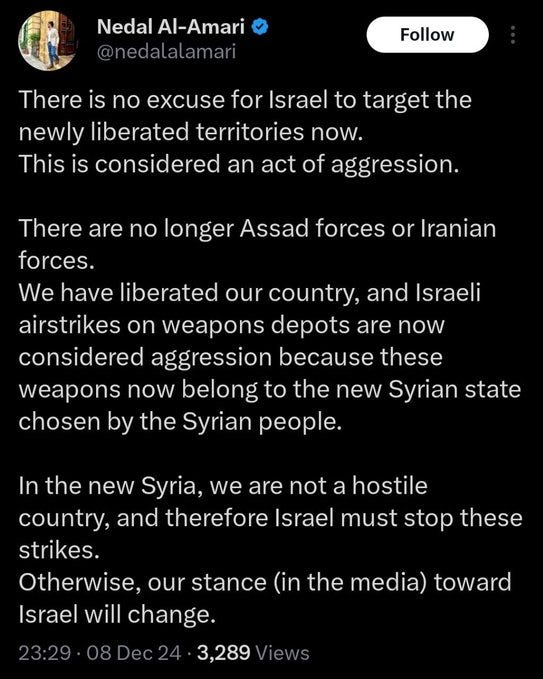Sic transit gloria mundi
Syria has fallen, and history will be strewn with an endless banquet of takes and interpretations as to what happened, how, and why. Here I offer one humble middle approach to piece it together, supported by facts and some deductive reasoning, rather than emotional gut reactions.
What do we know so far?
Firstly, there are now indications ‘rebels’ informed Turkey of their intentions to launch an offensive on Aleppo six months ago, according to Reuters:
The armed Syrian opposition, which took power in Damascus the day before, informed the Turkish side six months ago of its intention to launch a large-scale offensive against the official Syrian authorities, Reuters reported.
“Syrian opposition groups... informed Turkey about plans for a major offensive about six months ago and believed that they had received its tacit approval,” the news agency reported.
At the same time, the United States said that Washington was not aware of Ankara’s “tacit approval” of the armed Syrian opposition’s plans to attack the Aleppo province in the north of the Arab Republic.
I mostly agree with Scott Ritter’s take here that the operation was never meant to topple all of Syria and that this became a kind of emergent improvisation after all the hyenas of the region saw how weak Syrian armed forces were in responding to the initial foray. There is ample ancillary evidence to suggest the assault was initially meant to be limited—but of course grew in scope as Israel, US, Turkey, and others began to see opportunity and activated their various sleeper cells, as well as began to secretly court Syrian generals and other influential army figures to essentially surrender or betray Assad in one way or another.
Here’s one analyst’s take on how the militants did not expect such success. It mentions that the Russian army reportedly offered to upgrade and train the SAA much more directly several years ago, but was for some reason refused.
We now have a better understanding of why, precisely, events unfolded, and how Syria had become so weak, directly from first hand sources. Though he’s the least trustworthy character, Erdogan explained that he had offered Assad a deal—in his words—to bring back some Syrian refugees as well as for Assad to influence Kurds on the Turkish border to pull back. One suspects there’s much more to the ‘deal’ than Erdogan reveals, but other figures have somewhat corroborated the above.
Here, Iranian Foreign Minister Abbas Araghchi openly reveals that Assad had become too inflexible in being open to the Astana process ‘dialogues’ with the opposition:
First he mentions that Assad himself was shocked at his own army’s collapse. The FM implies Assad had poor working knowledge of the internal situation of his own military, which we’ll get to in a moment.
Then he lays it out:
“It must be said that the path did not progress as well as expected, and Mr. Assad’s government in this regard was somewhat inflexible and slow in making progress.”
But now the Syrian ambassador to Russia himself, Bashar al-Jafaari, went even further in condemning the decadence under Assad:
The government’s rapid fall is evidence of its unpopularity among the people and army, the diplomat has said.
Granted, he could just be trying to curry favor with the new ‘administration’ to jockey for a job, but his words seem to echo other officials in close contact with Assad’s government:
Commenting on the developments, al-Jafaari condemned the former president and suggested that his ousting was long overdue.
“The collapse of the corrupt system in a matter of days is evidence of its unpopularity and lack of support both in society and among the army and the armed forces,” the diplomat told RT.
He added that the “shameful and humiliating escape of the head of this system under the cover of night, without any sense of national responsibility to the country, confirms the need for changes that have occurred.”
Al-Jafaari further hailed the regime change, stating that Syria has “finally become a true homeland for all Syrians” and called on its people to unite and cooperate in restoring security.
WaPo likewise cites a Syrian diplomat in claims that Assad refused a last minute deal to cut ties with Iran, which I mentioned last time:
On the eve of his overthrow, former Syrian President Bashar al-Assad refused a deal with the United States on Damascus ceasing logistical assistance to Tehran and providing its territory for the delivery of aid from Iran to the Lebanese Shiite organization Hezbollah in exchange for a gradual lifting of American sanctions, The Washington Post (WP) reported, citing former Syrian diplomat Bassam Barabandi.
More fatal for Assad, according to WP, was his refusal to establish relations with Turkish President Tayyip Erdogan, who offered to normalize relations with Damascus in exchange for containing Kurdish formations and the return of at least some of the Syrian refugees to the territory of the Arab Republic.
There are other perspectives, of course. For instance, here an Iranian hardliner claims that the ‘progressive’ new president Masoud Pezeshkian simply did not allow Iranian forces to fight in Syria:
Iranian hardliner and expert on Syrian affairs Sohail Karimi claims that the reformist government of Pezeshkian does not allow Iranian troops to fight in Syria:
"We are not allowed to fight in Syria.
We gave 6,000 martyrs in Syria to fight these terrorists, their death should not be in vain…"
And here former deputy of the Iranian Quds forces says Turks and other Arab countries deceived Tehran, which was reportedly ‘worried about movement in Idlib two months ago’.
"We asked the Turks and some Arab countries and received assurances that there would be no movement. Hakan Fidan in particular told us this. I wish we had not been deceived by them and had taken precautions and reinforced our forces in Syria."
Many people obviously feared that Pezeshkian would be some kind of Western-liberal plant, but I don’t think it’s so black and white. A combination of the above factors was clearly responsible for what happened and how rather than direct and pre-planned betrayal on the part of the Iranians or Russians.
There are many videos of SAA soldiers condemning the army, Assad, etc., during the events of the past few days. Here one angry SAA soldier shouts that Hezbollah Radwan special forces sold them out, Iran, Russia, and Assad himself all ‘sold them out’:
I’ve now seen statements that Hamas supports the revolution and welcomes the new Syrian government, so you can add them to the list too.
In reality, people in their confusion have blamed everyone. Many for instance blame Russia, and perhaps Iran, for not allowing Syria to “go all the way” in 2018-2020, to finish off Idlib, which would have prevented all the foregoing events. The same goes for locking Syria into the Astana and Sochi agreements.
The problem is, such people have short memories and do not realize the situation was not so simple. Though Syria churned through the jihadists’ strongholds in the 2018-2020 campaign, the fact of the matter is Idlib was deemed strictly off limits by both Turkey and the US:

You might ask: surely Russia isn’t afraid of both Turkey and the US and could protect Syria against them both? Well, Russia tried—see the Balyun strikes where both the Russian and Syrian airforce devastated Turkish columns, leaving ~70 Turkish troops dead.
The problem is, an angered Turkey then launched an offensive into Idlib which utilized Bayraktar drones in devastating swaths of Syrian armor and personnel. Depending on who you believe, the SAA was effectively “crippled” by the attacks, having lost nearly 100 pieces of heavy armor, artillery, air defense, and hundreds of men or more. As you can see, ideations about conquering Idlib at the time aren’t as realistic as some believe. The US and Turkey were both prepared to go to war to save their Al-Qaeda stronghold, and Russia astutely saw fit to compromise and “quit while they were ahead”, since the SAA had just recaptured huge amounts of land up to the Idlib deconfliction zone; and so Russia and Turkey formalized another addendum to the Astana process to deconflict at that time.
Think about it from Russia’s perspective, western Syria was mostly recaptured save for a tiny strip in the north—was WWIII really worth trying to recapture one last town whose residents hated Assad to begin with? It wasn’t Russia’s fault that after that time—as we now know—Syria began a slow painful decline, owing to the US’ economic terror and strangulation of its economy.
Just check around April 2020 on the map below and ask yourself if the risk was worth it for that final sliver of seemingly inconsequential land in the north:
Reluctant Ruler
This brings us to the next thing which needs to be said.
I consider Assad a kind of tragic figure because it appears now in retrospect that while he was a good man and kind leader, he may not have been an effective leader. The reality is that he was never meant to become ruler. He was a simple doctor-in-training while his older, firmer brother Bassel al-Assad, elder son of Hafez, was meant to inherit the throne until he tragically died in a car accident in 1994:
Bashar al-Assad was not initially destined to become the president of Syria. His older brother, Basil al-Assad, was being groomed for this role by their father, Hafez al-Assad. Basil was seen as the preferred successor and had been prepared for leadership from a young age. However, his life took a tragic turn when he died in a car accident in 1994, which drastically altered the succession plan.
Following Basil's death, Bashar, who was studying ophthalmology in London at the time, was recalled to Syria. He had to abandon his medical career and quickly adapt to a political and military role. Hafez al-Assad then began to prepare Bashar for leadership by enrolling him in military training and positioning him within the government. Despite his lack of political experience, Bashar eventually succeeded his father as president after Hafez's death in 2000.
Just look at the eldest son’s training—that’s who was meant to lead Syria:
Trained in parachuting, he was commissioned in the Special Forces and later switched to the armoured corps after training in the Soviet military academies. He rapidly rose through the ranks, becoming a major and then commander of a brigade in the Republican Guard.
It can be inferred that Bashar’s lack of training for the role, and his incompatible disposition likely led to his not being a good military commander-in-chief. By all accounts, Assad appeared aloof when it came to the running of his army, leaving everything to his generals which—according to some—resulted in the slow degradation and corruption of many high level military officials. We can never know quite for certain how much blame rests with him, but these are educated deductions based on both sides’ accounts.
The soft-spoken, mild-mannered, intelligent ruler may not have had the required gravitas to properly thrive in a barbarous region overrun with vicious enemies on all sides. This, along with the many native traitors now condemning him, has led some to express the sentiment that: “Syria did not deserve Assad.” In some ways it feels like no country deserves his kind of thoughtful, temperate leader with such an exemplary and graceful first wife and family.
As an anecdotal aside, Assad’s emails were once hacked by rebels at the start of the war, and virtually the only ‘incriminating’ material they could find were love notes to his wife; e.g. from CNN:
“If we are strong together, we will overcome this together … I love you …” al-Assad wrote his wife the day the Arab League suspended its monitoring mission in Syria because of a spike in violence.
Days later, the 46-year-old ophthalmologist-turned-autocrat doodled an elaborate sketch of a large pink and red heart on an iPad and e-mailed it to his first lady.
Asma, who boasts in one e-mail to a friend that she is the “REAL dictator” in her relationship, reciprocates the affection, once writing her husband a short poem.
“Sometimes at night, when I look to the sky, I start thinking of you and ask myself, why? Why do I love you? I think and smile, because I know the list could run on for miles.”
Now in the overthrow’s aftermath rebels have ransacked Assad’s residence and found his private family album, again revealing nothing more than a wholesome family man starkly contrasted with the picture the cretinous West has painted of him:
To come full circle and underscore the above characterization of a reluctant leader, rumors claim Assad—who has now been confirmed by Russian foreign ministry as being safe in Moscow—intends to go back to private life and open up some kind of ophthalmology clinic in Russia, if one can believe it:
A different variation of the rumor:
Assad is retiring completely from politics with his family
>He is going to resume his career in ophthalmology (eye doctor) setting up an international specialized field hospital in Russia, Abkhazia and Dubai along with doing charity work
I’m skeptical, as it seems far too early for him to have made such decisions, so take it with a grain of salt—but at the same time, I see no other realistic option for him. Perhaps should Syria become federalized or outright balkanized he could return as governor of a rump Latakia:
Or then again…maybe not.
For the Empire, a Historic Victory or Grand Illusion?
Many now espouse the understandable sentiment that Israel and the US have achieved an unprecedented victory over their enemies. The Hamas October 7th attack which unleashed a domino effect of consequences has been deemed as one of the most catastrophic blunders in history.
On the surface the above assessment does appear reasonable. Israel appears to have achieved its aims in destroying Gaza, decapitating the leadership of all enemies in its vicinity, and entirely destroying Syria overnight.
But I posit that these are short lasting effects which have not solved Israel’s core strategic aims, and in fact may have condemned Israel to a far worse fate than would have been the case otherwise.
First, let’s start with the obvious. At the moment, Israel is no closer to achieving its aims of returning its hostages, repopulating its citizens, or actually defeating Hezbollah as a fighting force on the battlefield. Israeli society has taken major blows in the last year of this crisis, and the trust in the government which was lost will not be recovered for a long time, if ever. The same goes for institutional trust, particularly between the military and political wing. Israel still appears headed toward decline.
Granted, there are potentialities for Israel to emerge on top, they simply don’t look likely just yet.
Let us mention that just like CNN, Times of Israel conducted an interview with a “rebel” commander who made quite obvious their relationship with Israel:
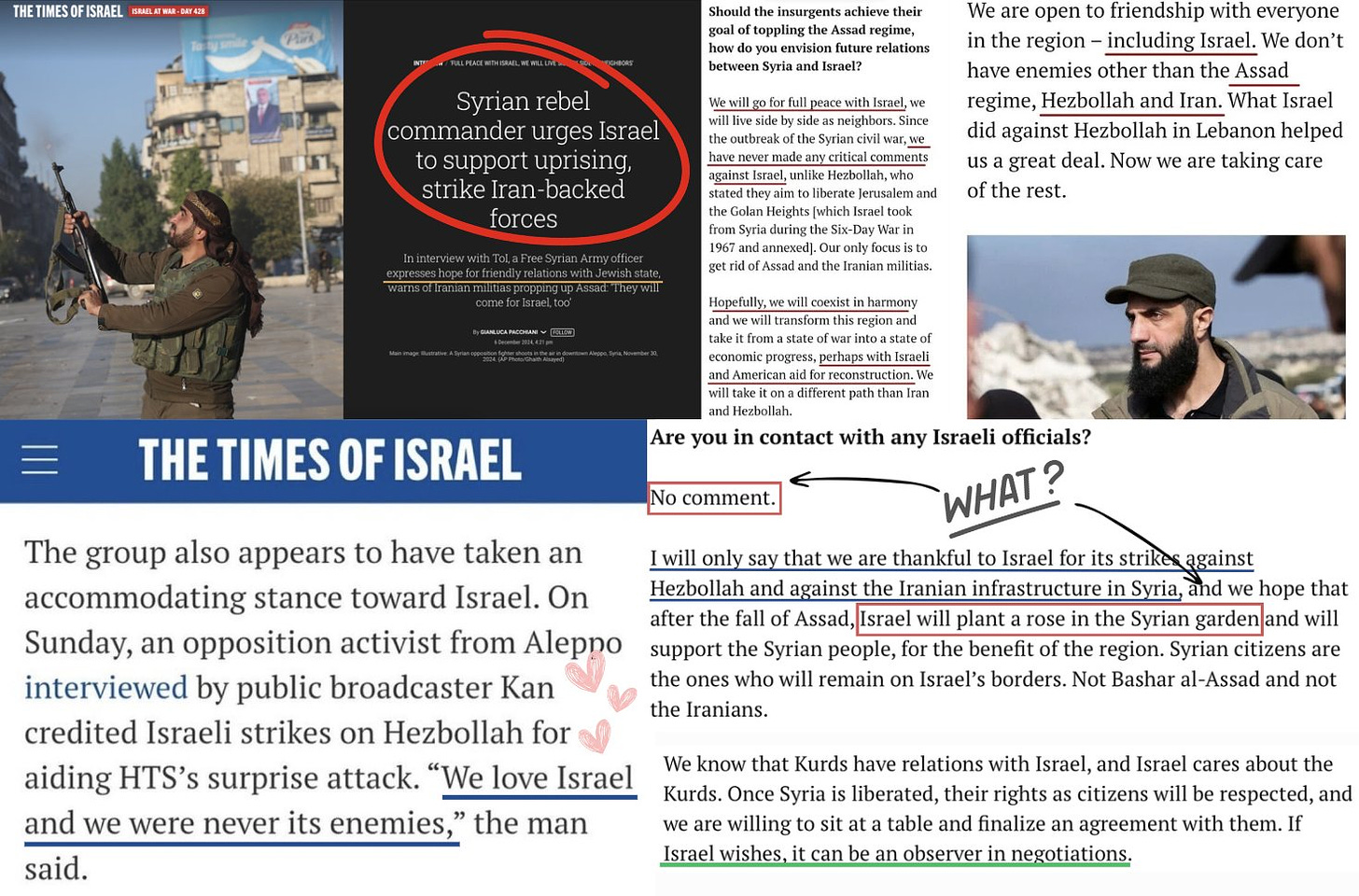
And videos like the below have emerged showing one of the rebels speaking to an Israeli TV channel, promising a period of “harmony, peace, and love with Israel”:
At first glance, such developments appear to hint that Israel has a love affair with the rebels, and they together have achieved a great victory over their enemies. However, there are many problems with this analysis.
Firstly, Turkey is most likely to emerge as the chief victor and dominant influence over the powers in the region. Ostensibly, the group it controls most is the SNA rebels—aka FSA or TFSA, which are not on perfect terms with HTS. However, ultimately the Syrian project has been a Turkish one, and Turkey’s main drive of Ottoman Empire revanchism will eventually clash with Zionism’s Greater Israel project.
Recall that the Ottoman Empire has classically controlled all of Palestine for hundreds of years, which includes Israel itself. You can levy accusations against Erdogan double-dealing and supplying Israeli oil and such, but these are all realpolitik practicalities and do not change the ultimate telos of Turkey’s destiny: to pursue restoration of its lost Ottoman lands, which includes not only all of Syria but Palestine as well.
That means by defeating an ‘independent’—but ultimately innocuous—Syria, Israel has just condemned itself to a future fate far worse than facing even distant Iran.
Signs have already begun to appear—here are two videos of HTS rebels drunk on yesterday’s conquest; listen to their words carefully as they threaten to take back Al-Quds, also known as Jerusalem:
Is it any wonder why Hamas now fully supports HTS’ conquest of Syria?
Does Israel even realize what it has just helped to facilitate? Instead of a peaceful secular state on its borders, it may soon have a rabid caliphate, led by someone without Assad’s temperance and pumped up by Turkey into a reconquista of Jerusalem and Gaza. Israel thinks it has eliminated Iran from the chessboard but instead it has potentially brought on someone even far more historically aggressive, and someone who—unlike Iran—has an actual, real historical bone to pick with the colonial pretender that is Israel.
Israel seems to perhaps sense the blunder, as it began to immediately destroy ex-SAA military infrastructure before it falls into the new rebels’ hands: both Mezzeh airbase in Damascus and Syrian ships in Latakia were hit.
There is now essentially no reason for the various Shiia militias and the Sunni jihadists in/with HTS to keep beefing — while Israel de facto made itself regional public enemy number one because it couldn’t be assed to wait a week (regarding seizure of ‘buffer territory’ and new strikes).
Helen fucking Keller could see how egregiously terrible this looks — the main obstacle for a unification of forces were tensions over Assad. The big baddy is gone with everyone from across Syria triumphantly marching in the streets — and Bibi in his infinite wisdom decided to replace Assad in Syrians (and everyone else’s imagination) with himself.
Syrian ‘revolution’ journalist from Daraa expresses outrage at Israel’s sudden attacks on Syria, which underscores the wider sentiment of the ‘opposition’:
That’s not to mention a plethora of FSA revolutionaries have inexplicably come out celebrating Assad’s downfall with glorifications of….Saddam Hussein:




“Saddam is the true leader of all Sunni Arabs!”
Not exactly a good sign for the US-Israeli axis.
More and more recently Israeli figures have noted the need for expansion, hearkening to long-awaited Greater Israel prophecies:
Dugin reminds us of the eschatology of top Likudniks who’ve promised to demolish Al-Aqsa in order to build the Third Temple and bring about the messiah:
Recall that Golan Heights is the eponym from which the nisba Al-Jolani (Golani) comes from. The HTS leader’s family is from the Golan Heights, and was displaced by Israel in the Six Day War. Can you see the problem here?
A claimed unearthed older video:
Even as of this writing, Israel appears to be making a play toward Damascus, which Smotrich and others have promised to capture.
Israel is on a preordained path to more than just ‘local friction’ with Sunni groups: this is an eschatological show down that appears to be proceeding precisely to plan, which will lead down the line to Israel’s ultimate destruction.
Russia and Iran Defeated?
And as for Iran and Russia—has Iran been “defeated”? Well, Iran itself has not been touched, but rather its proxy. Iran still maintains its most significant proxy of the Houthis, which leverage pressure on the world’s greatest strategic chokepoint. In fact, it was Israel whose vulnerabilities have been exposed these past few months, when Iranian scuds rained down with impunity.
Iran still maintains its influence over the region via Iraq and its growing normalization with other Arab countries. Has Israel severed Iran’s ability to supply Hezbollah, causing Hezbollah to eventually wither at the root? That could be—time will tell. But Israel may have just invoked a far worse enemy on its border. Even so, clipping Hezbollah’s wings does nothing really to Iran itself, it just takes away one Damocles sword Iran had over Israel. But does that somehow give Israel its own Damocles sword over Iran? No. Plus, Iran could find new ways to supply Hezbollah, particularly with the melange of new alliances which are soon to form from this heady brew. After all, despite various blockades Iran has found ways to supply Yemen.
And Russia: has Russia been “defeated” by the US or Israel? Well, thus far the ‘rebels’ have already stated a desire to have diplomatic relations with Russia and have given permission for Russia to retain its naval bases.
“Leaders of the armed Syrian opposition have guaranteed the security of Russian military bases and diplomatic institutions on Syrian territory” — a source in the Kremlin told TASS
Here’s a new Syrian opposition member expressing just that:
A Syrian opposition representative said good relations with Russia are needed: it is "a very important actor in the world."
Syria needs all the help in the world. More than half of our population are IDPs or refugees," said Anas al-Abda, a member of the Syrian National Council currently based in Istanbul.
So what did Russia lose? For now, Russia lost the money-sink of pouring billions of dollars into protecting Assad’s government, potentially freeing up vast amounts of both troops and funding to serve the SMO. Does that sound like a loss?
There are many different ways the situation can fork from here on out, with some rumors claiming the establishment of some new and closer Russian-Israeli alliance vis-a-vis Syria, while I can see potential for an increased Russian-Turkish proximity in the future, particularly given Erdogan’s odd new remark that he and Putin are ‘the only two leaders in the world.’
Critics point to Russia losing its resupply operations to Africa via Latakia and Tartus: as can be seen, for now there is no threat of that. It’s the US itself which remains on unstable footing given that Iraq is seeking to boot the US with increased urgency, not to mention Trump’s claims of withdrawing from Syria. That’s in addition to Russia potentially getting a naval base in Libya, Algeria, or Port Sudan in the future, as been discussed.
Iran and Russia did not lose one soldier or any amount of vital assets over this. They are at their full readiness. And now the West has to sort out Syria, explain to the world what it's doing there, and pay for its rehabilitation. Does this sound like such a bad deal?
Syrian Future
It’s impossible to tell for certain what the future holds for the Syrian people themselves. However, there is some chance for optimism. If the US gets the format it likes it may rescind sanctions and resume aid which will ultimately be better for the Syrian people themselves, so long as Al-Qaeda—I mean, the new ‘democratic government’—honors their newly redefined role as true ‘moderates’, even if it’s just for show.
In fact, Biden was quick to already announce new ‘relief aid’—after a mumbled self-aggrandizing word-salad intro, that is:
Mike Benz writes:
The billions in new “aid” money to Syria will simply be to capacity-build all the new “democratic institutions” that will functionally control the policy, direction, & governance of the new regime, to make sure it never strays from the US State Dept that backed its rise to power
The ideal for the US would be to prepackage the narrative that Assad was the source of Syrians’ suffering by quickly showing a new ‘prosperous’ Syria, when in reality it was simply the sanctions tap being turned on or off at will that exercised total dominance over Syrians’ future and wellbeing.
Final Thoughts
The one big silver lining apropos Russia is that the unexpected upheaval of this event could act towards re-centering Russian priorities in Ukraine by giving a dose of reality to not only how quickly situations can change, but how dangerously ‘loaded’ unattended frozen conflicts can turn out to be. Russia must win the Ukraine war decisively, because the Empire is clearly not done yet and is going out swinging on all fronts.
But RussiansWithAttitude said it well enough so that I don’t have to:
FIVE LESSONS FOR RUSSIA
Doom and gloom are somewhat appropriate, but it is more important to think about the future now. What does the fall of Syria tell us?
1. False Peace is Death. A bad faith ceasefire is a recipe for disaster and after Minsk and Astana should never be repeated. False peace is worse than war, because false peace means you still have to fight the war later, but at a disadvantage. No green busses or green corridors for the enemy, no deescalation zones, no freezing of any lines. The enemy has to be defeated completely: victory is a prerequisite for mercy. Until that is achieved, no ceasefires, only death under FABs.
2. Collapse is always sudden. The Assad regime resisted NATO-Israeli aggression for 13 years. And then it fell in a week. Mistakes, systemic errors and structural attrition accumulate until a critical mass is reached, and at that point the smallest impact will bring down the entire house of cards. Likewise, our current enemy in the main theater will resist stubbornly, until he will not be able to anymore, and then we will see Big Arrows. All our efforts should be focused on damaging the enemy's war-waging capabilities to reach that critical point.
3. Infantry is King. A single full-sized, dependable Russian infantry brigade (or a Ukrainian one, for that matter) would have been able to defeat the Jihadi advance for good. They were completely overstretched and to a large degree their offensive was a bluff that only worked because the SAA didn't even try to resist, they just ran. We had our own experience with a lack of infantry in the SMO -- it led to the Kharkov oblast debacle in fall '22. No matter what anyone says, no matter what technological advances there are, the infantry unit was and remains the central actor of history, upon which all else depends.
4. Empire is secondary to the Nation. There was a loud public debate among patriotic circles in Russia when the intervention in Syria began in 2015. Personally, I was opposed to the intervention because it seemed absurd to me to send Russian men to die in a foreign desert while Russian people are suffering under the yoke of Banderite occupation just across the border. We were told by Kremlin propagandists that "Palmyra is a symbol for all mankind" and the Donbass is just, eh, the Donbass. Whatever. Now, Jihadi dogs will get to loot and destroy all that archaeological treasure of all mankind, and we have to fight for the Donbass, anyway. Was it worth it? I have always been staunchly pro-Assad, but a single square mile of Russian land in Novorossiya means more to me than the entire Middle East. A nation should have its priorities in order.
5. You can't change nature. Some peoples and countries are just unreliable. They will never have stable polities unless compelled by overwhelming force or foreign occupation. They will never build working institutions on their own. You can't just offer them a comprehensive reform package and then shrug when they refuse to implement it. They will always be shitty client states if you work with them within a civilized framework. We know how to work around local particularities in other parts of the world, so we should let Middle East policy also be guided by this knowledge. They are not Warsaw Era-pact allies you can let do things on their own.
The foregoing circumstances could act as a catalyst to remind Russia of the existentiality of the current global conflict. The stakes are everything and Russian leadership may now see just how critical it is to make sure that the West is decisively defeated in Ukraine.
As a final few bonus videos I consider must-watches:
First, Dana Stroul, who was the Pentagon’s “top civilian official responsible for the Middle East” as Deputy Assistant Secretary of Defense, says quite a few quiet parts out loud about what really destroyed Syria’s economy and impoverished its people:
Note how for the first time she specifically admits the US military’s squatting on eastern Syria was not just about ‘fighting ISIS’ but rather for leverage over the ‘political process’ in Syria—just another way of saying economic terrorism as collective punishment for Syrians to force them into overthrowing Assad.
“Syrian expert” Joshua Landis callously reaffirms this by openly admitting that Syrians are only rising up because “the Assad regime can’t do anything for them, because it can’t get out of sanctions”:
Think about that for a moment. The Assad government not being able to do anything for them is meant to be some kind of ‘dunk’ against Assad, yet in the same breath Landis hideously confirms the reason the government can’t do anything is because of the US’ crippling sanctions on the country. How low-intelligence must one be to not make this facile connection?
Lastly, the former head of MI6 admits HTS was Al-Qaeda but claims they have reformed into a “liberation movement, not a terrorist organization”—quite a distinction:
Your support is invaluable. If you enjoyed the read, I would greatly appreciate if you subscribed to a monthly/yearly pledge to support my work, so that I may continue providing you with detailed, incisive reports like this one.
Alternatively, you can tip here: buymeacoffee.com/Simplicius





